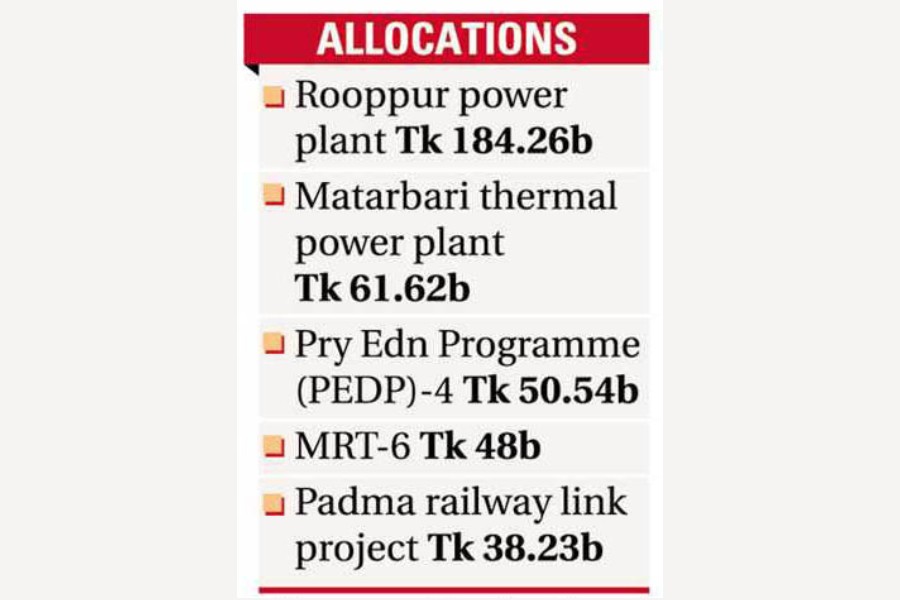The government allocated one-fourth of the next year's development budget to 10 mega projects notwithstanding their unimpressive implementation rate.
Like the previous fiscals, the government has kept aside the highest aggregate allocation of Tk 544.51 billion out of the Tk 2.25 trillion Annual Development Programme (ADP) outlay, for the mega projects in the next fiscal year (FY) 2021-22.
Some development analysts maintained that the decision to allocate a big chunk of resources in the next ADP was not a wise one given the experience gained during the pandemic-hit outgoing FY.
They felt that the government should attach priority to health, agriculture, social protection, and education sectors, which are very important to weather the coronavirus impact, they added.
The government's highest economic policy-making body, National Economic Council (NEC), on Tuesday endorsed the ADP for the upcoming fiscal, allocating some 24.2 per cent of total resources for the 10 mega and 'fast-track' projects.
According to the Planning Commission, the US$13 billion Rooppur nuclear power plant project has got highest Tk 184.26 billion.
The implementation of the nuke project has suffered this fiscal as normal travel of the foreign consultants and workers was affected due to the Covid.
The government has allocated second highest Tk 61.62 billion to the 'fast-track' Matarbari thermal power plant project in the ADP for the next fiscal.
The Coal Power Generation Company Bangladesh Limited (CPGCBL) had already sought revision of the project with the extension of three and a half years more time to complete the work.
The existing deadline for completion of the power plant installation work is June 2023.
Project insiders said the CPGCBL had completed some 45 per cent of the overall project in the Matarbari area.
With the financial support of Japan, the company started construction of the 2X600MW ultra-super critical coal-based power plant in Maheshkhali Island in 2014 at Tk 359.84 billion (US$4.28 billion) cost.
The Primary Education Development Programme (PEDP)-4 has obtained Tk 50.54 billion fund, the third highest, in the next ADP.
Another 'fast-track' project, the MRT-6 has got the 4th highest amount, Tk 48 billion, in the development programme.
Implementing agency of MRT-6 -- Dhaka Mass Transit Company Limited (DMTCL) -- has already hinted that the 20.1km-long project worth Tk 219.85 billion had faced hurdles due to the coronavirus - this may delay the commissioning of the metro rail (up to Agargaon) in December this year.
The Padma railway link project of the Bangladesh Railway (BR) has got the 5th highest Tk 38.23 billion.
The BR started the Tk 392.5 billion railway link project on the Padma Bridge in 2018; the project is still in its weak trajectory in terms of implementation.
The Bangabandhu railway bridge construction over the Jamuna River project has received Tk 35.80 billion, 6th highest allocation, in the next FY2022.
With the financial support of Japan, the BR is working to construct the bridge parallel to the Bangabandhu multi-purpose bridge over the Jamuna River.
The government allocated Tk 35 billion, 7th largest single allocation, in the next year development programme for constructing the Padma Bridge over the Padma River.
Failing to spend its allocated fund in the original ADP in the last FY2020, the Bangladesh Bridge Authority trimmed down its fund demand to Tk 40.15 billion in the revised ADP from the original allocation of Tk 53.71 billion.
The Dhaka-Ashulia Elevated Expressway project has received the 8th largest fund allocation in the ADP as the government kept aside Tk 32.27 billion for the project in the next FY2022.
The Expansion and Strengthening Power System Network under the DPDC area project has obtained Tk 30.51 billion -- the 9th highest single allocation in the newly approved development budget.
The government has allocated the 10th highest Tk 28.27 billion for the Expansion of Hazrat Shahjalal International Airport (HISA) in the upcoming fiscal.
The civil aviation ministry is working to set up the 3rd terminal beside the existing airport aimed at expanding the facilities of the HSIA in Dhaka.
Former World Bank Lead Economist in Bangladesh Dr Zahid Hussain said health, agriculture, social protection for the vulnerable, education are the topmost priorities at this moment.
"The usual volume of allocations for those important sectors are least expected. The mega projects which are struggling because of implementation delay should get less priority at this moment," he told the FE.
The country's health service is very poor. Millions lost their jobs during Covid time, he said.
Agriculture is the backbone for the recovery, while education sector is more important at present, said Dr Hussain.
Taking into consideration all these, the government should have gone for a special ADP preparation this year, rather than framing the traditional one, Dr Hussain added.
Research Director at the Centre for Policy Dialogue (CPD) Dr Khondaker Golam Moazzem told the FE that by slashing some allocation from the slow-moving mega projects, the government could allocate higher funds to those projects which could create more employment in urban and rural areas.
Since some of the mega projects are struggling for implementation delay due to the Covid pandemic, these funds could be diverted to the priority sectors like health, education, agriculture, rural development and education, he said.
A member at the Planning Commission said they had to allocate higher allocation for mega and first track projects as higher authorities wanted so.
They could not provide adequate allocations to some small and medium-sized projects in the ADP as the government has a limitation of funds in the budget, he told the FE, requesting for anonymity.
"It is interesting that the implementing agencies seek higher funds in the original budget but surrender in the revised budget," the member said.
"Almost all the mega project authorities had surrendered their earmarked funds in the last year's ADP, whereas many small and medium projects struggled due to fund shortage."


